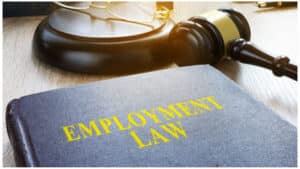Written By: Chris Dolan and Emile Davis
This week’s question is from Tim from Oakland: I own a small business selling high end garage doors. Last Thursday, one of my employees got in a car accident on her way home from work. She doesn’t always drive, but on Thursdays she has to go meet potential customers to give estimates, so she has to drive around the city a bit to get to them all. Sometimes she comes back to the office, but not always, sometimes, she goes directly home from the last estimate. Luckily, she wasn’t hurt, but the other driver had a broken collar bone. Their lawyer just called me to say that since I was her employer I might be on the hook and asked about my insurance. But she was not on the clock, she was done for the day, and it was her own car, not a company car. Do I have to tell my insurance and am I responsible?
Hi Tim, First off, I am glad that your employee is okay and am hopeful that the other driver heals well and quickly. I do want to thank you for reaching out with this interesting question about an issue that affects employees and employers alike.
In its largest sense, the issue you are asking about is: under what circumstances might an employer be held responsible for the acts of its employees. There are various times when an employer is responsible for the acts of employees. It is a legal doctrine known as respondeat superior. As you have recognized, when an employee is “on the clock,” it is much more likely the employer will be held responsible for the negligent actions of an employee.
More specifically, and as it relates to your question, it is best to start with the original rules. Historically, the general rule has been that an employer is not legally responsible for the acts of an employee when the worker is commuting to, and from, the workplace. This is often referred to as the coming-and-going rule. The going-and-coming rule is based on the theory that the employment relationship is suspended from the time the employee leaves their job until they return. And, also, that during the normal everyday commute, the employee is not rendering services directly or indirectly to his employer.
However, as with many legal rules there are several exceptions. For instance, there is a “vehicle use exception” to the going-and-coming rule. When an employer requires an employee to drive to and from the workplace so that the vehicle is available for the employer’s business, then the drive to and from work is considered within the scope of employment and the employer may be responsible for accidents that occur on the way to or from the workplace. Importantly, the employer’s requirement of having a vehicle may be either express or implied. That means that it is not necessary that this be a specific stated rule. So long as it is understood that the employer requires use of a vehicle, then the exception may apply.
The drive to and from work may also be within the scope of employment, and therefore potentially expose the employer to liability, if the use of the employee’s vehicle provides some direct or incidental benefit to the employer.
In your case, it appears at first glance, with the limited information provided, that your employee uses the car regularly for work. Insomuch as she drives her own vehicle around town to perform estimates for your company, it appears there may be both a “vehicle use exception” to the going-and-coming rule, as well as an exception for providing a benefit to the company. Given the limited information, there is no way to know for sure how this would play out in the courts, but it is certainly important to pass the information you received to your insurance company.










